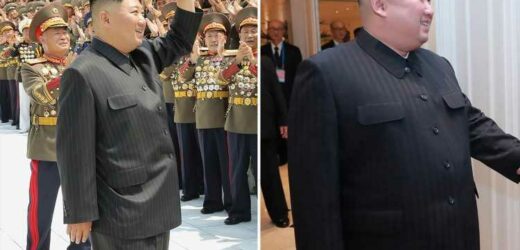KIM Jong-un looks skinnier than EVER after the dictator dropped more than 40 pounds amid a flurry of speculation about possible gastric band surgery.
The 37-year-old leader has piled on the pounds since he took power a decade ago – but he recently shed the blubber when he struggled to breathe after ballooning to 22 stone.
South Korea's spy agency said Kim has lost a lot of weight in the last year – possibly more than 40 pounds – after disappearing from the public eye for several months.
Kim was looking extra slim as he was pictured greeting commanders and political officers of the Korean People's Army in Pyongyang on Friday in a baggy grey pinstripe suit.
The National Intelligence Service said it is believed Kim hit a whopping 22 stone last year after gaining around a stone a year since coming to power in 2011.
According to one source, Kim's cronies said he gained weight due to work-related stress, drinking, heavy smoking and a high-fat diet.
At 5ft 7in, Kim has long been considered obese, after it was revealed he had piled on the pounds amid dire food shortages in his rogue state.
He has struggled with his health as a result of his spiralling weight and his fridge-raiding lifestyle.
Kim has a legendary appetite, apparently gorging himself on Swiss cheese, caviar and lobster while drinking multiple bottles of wine in a night.
SLIM KIM
But images of a new "slim Kim" emerged in June – and commentators have questioned whether his weight loss is intentional or due to a grave illness.
Kim might have been taking weight loss medication to shed the pounds – or he could have had a bariatric surgery procedure such as a gastric sleeve or a gastric bypass, 38 North reports.
Kim’s health has previously been a closely guarded state secret – but starving North Koreans have said they are increasingly worried about the health of their "emaciated" leader, according to state media.
A gastric band would lead to weight loss of five pounds every week – meaning it would have taken just under two months for Kim to drop 40 pounds.
Others have probed whether the Covid outbreak might have prompted drastic action from Kim, as his morbid obesity and likely cardiovascular disease and Type 2 diabetes are high risk factors.
Those close to the North Korean despot are said to have pleaded with Kim to get fit and "take some rest" for the "good of his people".
Chosun Media reports he was eventually persuaded to head to a secretive health retreat after an intervention by key officials.
'CRISIS SIMILAR TO WAR'
And as Kim asks North Koreans to tighten their belts more amid the country's worst famine since the 1990s, it could be politically wise for the leader to lose weight.
In June, Kim addressed the growing crisis in his country’s agricultural sector, admitting the situation was "getting tense".
The despot said the state-run economy cannot feed its citizens after domestic food production plunged following catastrophic flooding last year.
And earlier this week, he told war veterans the impoverished state was experiencing a "crisis similar to a war".
"We are faced with difficulties and hardship caused by the unprecedented global health crisis and prolonged lockdown no less challenging than how it was during the war," he said, according to the official Rodong Sinmun daily newspaper.
Most read in News
MAJOR SHOCK New evidence about chief Maddie suspect leaves investigators 'shocked'
Runaway bus packed with kids nearly hits woman before 'brake fail' crash
PM insists he hasn't broken law but vows to 'fully cooperate' with Met probe
Pupil joked about sex with my teacher boyfriend – then I found naked pics
While the price of essentials like rice and fuel have reportedly held firm, CNN reports citizens in the state’s capital Pyongyang are paying triple the regular price for potatoes, and £50 for some teabags.
And on Friday, South Korea's central bank said North Korea's economy suffered its biggest contraction in 23 years in 2020 as it was battered by continued UN sanctions, Covid lockdown measures and bad weather.
Kim Byeong-yeon, an economics professor at Seoul National University who specialises in North Korea, said: "It is indeed a major crisis, and one that might bring bigger political repercussions as people now have far more economic interests and knowledge than the 1990s, having done trade, smuggling and other activities themselves."
Source: Read Full Article










